9 May 2014 | India, News and features, Politics and Society

The India media is the subject of the news yet again. This time though, the private news channels — the usual suspects – are only reporting the news. Instead, the latest war of words among politicians has thrown the public service broadcaster, Doordarshan, into the limelight.
Narendra Modi, prime ministerial candidate for the Bharatiya Janata Party (BJP) was interviewed by Doordarshan, and it appears that comments he made about a friendship with a senior member of the ruling Indian National Congress were edited out of the final interview. The news broke on social media, and immediately the channel was accused of censoring the statements that might make Congress seem too chummy with their sworn opposition.
The CEO of Doordarshan, Jawhar Sircar, in a letter to the board of Prasar Bharti, the autonomous body that runs the channel, made it very clear that the public broadcaster does indeed suffer from government interference. Reportedly, Sircar wrote in his letter that there has been a lost opportunity to convince a “young minister to break this long traditional linkage between the ministry and the News Division, which has continued unabated long after Prasar Bharati was born and assigned its distinct role in 1997”. This is a direct reference to the current Minister of Information and Broadcasting, Manish Tewari. In the same report, carried by the Economic Times, a member of the Congress have rubbished this claim, saying that Sircar is “merely currying favour with the new dispensation as he had never raised the issue of autonomy earlier”.
Narendra Modi interview isn’t the first time Sircar has brought up the question of autonomy for the broadcaster. Sircar’s personal website carried news items relating to “freeing Prasar Bharti from government control”, papers that suggest DD could follow the BBC’s annual license fee model, as well as older news items about how the channel, under the Congress-led UPA government has previously neglected to give Narendra Modi the kind of airtime the private channels have accorded. For his part, Minister Tewari has made a statement that “autonomy of Prasar Bharti is guaranteed by an act of Parliament. I&B ministry has an arms length relationship with Prasar Bharti”.
One can be sure the complaints about airtime will be flipped around if another party forms the government. Therefore, politics aside, the basic question needs to be addressed: despite an autonomous status, does the government in fact wield undue influence over Prasar Bharti (which includes radio as well)?
The current structure of the public broadcaster stands as such: the Prasar Bharti is an autonomous body that answers to the Parliament of India through the Ministry of Information and Broadcasting. All of its staff are officers recruited through the Union Public Service Commission, and are transferred to their positions at Prasar Bharti after having served in other government departments. There is belief that this might be the reason for the “government” mindset shown in the two directorates under the body; All India Radio or Akashvani, and Doordarshan, the television broadcaster. In fact, till 1997, both had been directly under the Ministry of Information and Broadcasting, but had been given this separation to be able to function in a “fair, objective and creative manner”.
The government had appointed a committee under Sam Pitroda, a man who is credited for helping Prime Minister Rajiv Gandhi bring the telecom revolution to India in the 1980s, to present a report on the function of Prasar Bharti. The report batted for more autonomy for the broadcaster, but went further and suggested that it also be open to use private sources of funding and monetizing its assets. In an event to release the report, Pitroda said that the broadcaster must “look at public interest and not just government interest”. Along with input on technology, human resource and content, the two volume report (which had the current CEO as a member) also delves into government and organisation. The suggestions include transferring complete ownership and management of assets to Prasar Bharti to make the organisation administratively and financially autonomous of the government, and setting up a regulatory body to ensure public accountability of all content on their radio and television networks, while acknowledging that the state does have a distinct requirement to “broadcast messages and accomplishments of public interest which can be met by using existing public and private broadcaster infrastructure”.
The report was submitted to the government in February 2014, and is “under consideration”. It will be up to the next government, to be formed in mid-May, to take action, especially in light of the recent controversy.
Not all are convinced of real change taking place on the ground. In editorial a few months before the report was released, the Pioneer suggested that “the Government supports the idea of an autonomous public broadcaster, in practice it has never been able to let go. Unless this fundamental dichotomy is resolved —either the Government gives up control or relinquishes the autonomy idea — the Government will continue to have a complicated relationship with Prasar Bharati, no matter how many expert committees it sets up. In the meantime, the tax-payer-funded broadcaster will continue to drain the exchequer and be of even less use to the public.” Others, such as media analyst Sevanti Ninan of The Hoot even questioned the genuine interest the government has in reforming the broadcaster by initiating the Pitroda expert committee, asking: “I don’t know why they are undertaking this just before the elections time because if there are radical recommendations there is no time to implement them.” In an article on the subject she addresses the crucial question of attracting talent, writing that “to attract the best personnel the salary/ package should be linked with the market compensation. The tenure of full time members should be for a period of five years and for the Independent Directors for a period of three years. So, no more pegging salaries at a level that only attracts applications from former government personnel. The CEO of Prasar Bharati so far, in its 16 years of existence, has always been a former IAS officer.” There are also serious updates needed in technology upgradation, content and presentation of the news.
For the moment, Doordarshan is thinking about probing into the matter of the edited Narendra Modi interview. But the larger problem cannot be solved on a case-to-case basis. Since 1996, Pitroda’s would be the fourth panel the government has created to look into this issue of Prasar Bharti. It would well be worth the effort for a new government to give the public service broadcaster to the public.
This article was posted on May 9, 2014 at indexoncensorship.org
8 May 2014 | Europe and Central Asia, News and features

Eurovision contestant Teo, in the music video for this year’s Belarusian entry Cheesecake (Image: Yury Dobrov/YouTube)
If you want a Eurovision of the future, imagine a faux-dubstep bassline dropping on a human falsetto, forever. That was how it felt watching YouTube footage of this year’s entrants in the continent’s greatest song-and-dance-spectacle.
The Eurovision Song Contest, born of the same hope for the future and fear of the past as the European Union, is approaching its 50th year. And strangely, it’s doing quite well. In spite of fears that the competition would end up as an annual carve up between former Soviet states, recent years have in fact seen a fairly equal spread of winners throughout the member states of the European Broadcasting Union (who do not actually have to be in Europe; a fact often missed by anti-Zionists who somehow see a conspiracy in the fact that Israel is a regular entrant in the competition is that channels in countries such as Libya, Jordan and Morocco are also members of the EBU, and technically could enter if they wish. Morocco did, in 1980). Since 2000, the spread of winners between Western Europe, the former Soviet states, and the Balkans and Turkey have been pretty much even.
While some of the geopolitics will always be with us — Turkey and Azerbaijan united in their hatred of Armenia, Cyprus and Greece douze-pointsing each other at every opportunity — the once-derided contest has in fact functioned as a genuine competition. Year in, year out, the best song in the competition tends to win, while the laziest entrants, not taking the event seriously as a songwriting competition (yes, we’re looking at you, Britain), tend to fall behind and then complain that Europe doesn’t “get” pop music.
The best songs and singers triumph, by and large. But Eurovision still does have a political edge.
Take Tuesday’s semi-final in Copenhagen. Russia’s entry, Shine, performed by the Tolmachevy Sisters and described by Popbitch as sounding like “almost every Eurovision song you’ve ever imagined” contained some unintentionally ominous lines:
Living on the edge / closer to the crime / cross the line a step at a time
Add an “a” to the end of that “crime”, and you’ve got the Kremlin’s current foreign policy neatly summed up in a single stanza.
I am not suggesting that the Tolmachevys were sent out to justify Putin’s expansionism. Nonetheless, the Copenhagen crowd were keen that Russia should know what the world thought of its foreign policy and domestic human rights record: as it was announced that Russia had made Saturday’s grand final, the arena erupted in jeering. The dedicated Eurovision fan is clearly not just a poppet living in a fantasy world of camp. They are engaged with the world, and particularly the regressive policies of countries such as Russia, Azerbaijan and Belarus, perhaps more so than your average European.
When Sweden’s Loreen won the competition in Baku, capital of Azerbaijan, in 2012, she pledged to meet the country’s human rights activists. That same year, BBC commentator “Doctor Eurovision” (he actually is a doctor of Eurovision) made explicit references to Belarus’s disgraceful dictatorship, rather than simply giggle at the funny eastern Europeans.
This raises an interesting question about how we engage with dubious regimes.
Before the Baku Eurovision in 2012, there was some discussion over whether democratic countries should boycott the competition, sending a message to Aliyev’s regime.
“No,” Azerbaijani civil rights activists told Index on Censorship. “Let the world come and see Azerbaijan.” They felt that for most of the world, most of the time, they are citizens of a far away country of whom we know nothing. They wanted to take their chance while the world was looking. I think they got it right. As discussed last week, Azerbaijan is engaged in a massive international PR campaign, but to most people in the world since that Eurovision and the attention it raised for the country’s opposition, it has not been able to entirely disguise its atrocious record on free speech and other rights.
On Friday, the International Ice Hockey Federation’s world championship will open in Belarus. Though there was some discussion of boycotting that event, it has died down. Nonetheless, journalists from Europe and North America will be covering the event, and fans will travel too.
Belarus’s macho dictator Alexander Lukashenko is a keen ice hockey fan, and will be aiming to sweep up the glory of hosting a major international sporting event, not long after the country hosted the world track cycling championships in 2013.
Ice hockey fans and sports journalists are generally not the type of people who go in for Eurovision. But maybe they should try to take a leaf out of the Song Contest supporters book. Have a look at the country around them, learn a little about the politics, and spread the word about the side the dictators don’t want us to see.
Autocrats try to use these international competitions to control the world’s view of them. We should beat them at their own games.
This article was posted on May 8, 2014 at indexoncensorship.org
8 May 2014 | Belarus, News and features
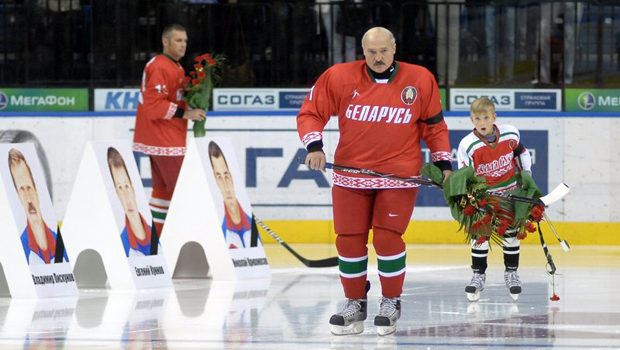
(Photo: Ivan Uralsky / Demotix)
Authorities in Belarus have been targeting human rights activists ahead of this weekend’s start of the International Ice Hockey Federation’s world championship in Minsk.
At least 17 political and civic activists were detained between 26 April and 6 May to prevent the organising of protests during the championship, which begins on 9 May. Another five are either in detention or being sought for questioning by police. All have been accused of minor hooliganism and sentenced to administrative detention of up to 25 days.
Such “preventive arrests” are common in Belarus. One of the activists, Pavel Vinahradau, who is known for his numerous detentions, opted to leave Minsk until the end of the championship. He had previously been summoned by the police: “They made it clear that either I go to Berezino (a small town 100 km outside Minsk) till 3 June, or I go to Akrestsina (a detention centre in Minsk). I choose Berezino,” Vinahradau wrote on Facebook.
A website called Totalitizator asks its visitors make predictions about which activists will be detained next, for how many days and on what charges. For people who follow political news in Belarus it is not difficult to make a choice.
Potential foreign “troublemakers” are also being kept away from the tournament. On Wednesday, Martin Uggla, a human rights activist from Sweden, was denied entry to Belarus when he was detained at Minsk-2 National Airport. According to temporary visa-free travel requirements, hockey supporters with valid game tickets do not require visa. Despite the fact Martin had one, border guards told him he was being prohibited from entering the country.
Belarus’ president Alexander Lukashenko is known for his love for hockey – and his unfulfilled desire of a real international profile. Consistent tensions with the Western democracies and an unwillingness to ease his authoritarian grip has deprived Lukashenko’s international relations of impact. Fifty-six of the president’s last 100 international visits were to Russia and Kazakhstan, though he has travelled to Turkmenistan, Venezuela, China and Cuba, as well.
The ice hockey championship in Minsk is set to become Lukashenko’s marquee performance on the world stage. That is why the government is rounding up activist voices. Lukashenko wants to present a calm, hospitable and prosperous country led by a wise and caring leader. The picturesque façade cannot hide the problems afflicting Belarus: An unsustainable economy hooked on huge Russian subsidies and a dismal human rights record.
Belarus remains the only country in Europe that still imposes the death penalty. On 18 April, 23-year-old Pavel Sialiun was, according to reports, executed. Sialiun’s case is still under review by the UN Human Rights Committee.
Nine political prisoners are still in jail in Belarus, including well-known human rights defender Ales Bialiatski, and former presidential candidate Mikalay Statkevich. A recent report by FIDH says they are in a critical situation. Many dissidents suffer regular restrictions to “their means of support, quality of food and medical assistance”, including being deprived of meetings with relatives and subject to limits on correspondence.
“Politically motivated persecution of civil society representatives and of the opposition is a general trend, and the limitations on political and civil rights of Belarusian citizens are pervading, both in national legislation and in practice,” says another statement by 12 human rights groups that represent the ice hockey championship participating countries.
But people who raise these issues are not welcome in Minsk these days. Even foreign journalists who are accredited for the championship are obliged to receive a separate accreditation at the Belarusian Foreign Ministry if they wish to cover issues other than hockey while in Belarus.
But many in the country fear the real issues to cover will appear after the championship is over on 25 May.
“Putin invaded the Crimea four days after the Sochi Olympics. Let’s see if Lukashenko will be that quick with another clampdown on civil society. But I am sure he will settle all accounts with us after the championship,” a leader of one Belarusian NGOs told Index in Minsk last week.
Next year, the country will vote in the presidential election. So there is more ice to come in Belarus after international hockey is gone.
An earlier version of this article specifically stated that both Ales Bialiatski and Mikalay Statkevich have been deprived of meetings with relatives and subject to limits on correspondence. While this may have been true in the past, we have not been able to confirm that this is currently happening to the pair.
This article was posted on May 8, 2014 at indexoncensorship.org
8 May 2014 | Azerbaijan, Azerbaijan News, Europe and Central Asia, News and features
This week eight young Azerbaijani activists were sentenced to between six and eight years in jail. The members of the N!DA Youth Movement, which works for democracy and social change, were convicted for possession of drugs and explosives, and for intending to “cause public disorder”. The charges are widely believed to be trumped up, and the trials have been criticised by foreign observers over “irregularities” and “shortcomings”, including inconsistencies in testimonies and mishandling of evidence.
This is just the latest addition to a long list of human rights abuses by authorities in the oil rich country. As the repression has largely been allowed to take place away from international attention, this is a good moment to remember a few things about Azerbaijan, especially as the country prepares to take over a six month chairmanship of the Council of Europe’s Committee of Ministers.
1) The six are far from the only political prisoners in Azerbaijan
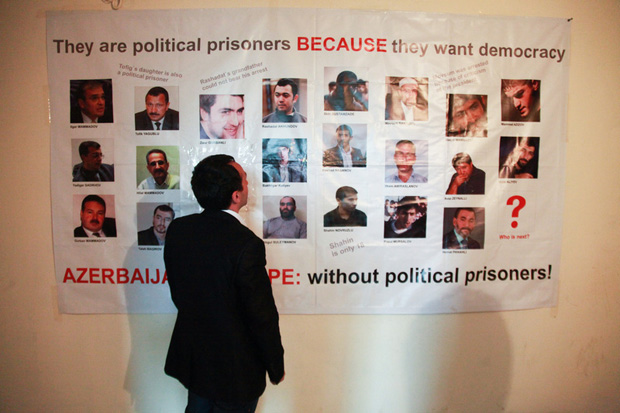
(Image: Aziz Karimov)
According to the latest figures, there are 142 political prisoners in Azerbaijan today. These include human rights defenders, youth activists, and a large number of religious activists, among others. There are currently 17 people serving life sentences. Ahead of the country’s presidential election last October, candidate Ilgar Mammadov was arrested. In March, he was sentenced to seven years in prison for “organizing mass disturbances” and “resisting the police”. Meanwhile, President Ilham Aliyev insists that there are no political prisoners in Azerbaijan.
2) You may escape imprisonment, but you could still face violence and intimidation
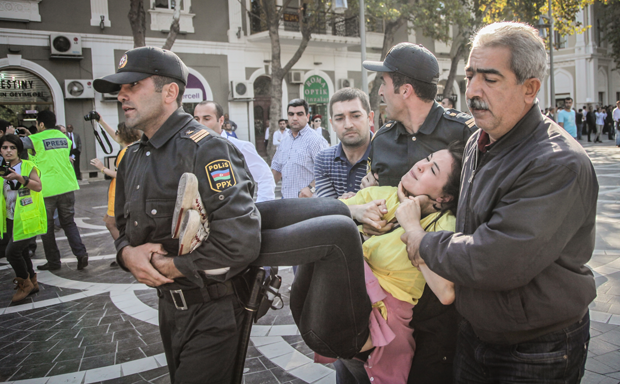
(Image: Aziz Karimov)
Attacks, threats and intimidation are regular occurrences for political opponents, activists and press in Azerbaijan. Following protests in the capital Baku as Aliyev secured his third consecutive term in power last October, demonstrators were beaten and detained by police. Police also raided the offices of independent Election Monitoring and Democracy Studies Centre (EMDSC) which reported irregularities in the election. In 2012, reporter Idrak Abbasov was brutally beaten when filming the demolition of a house by the State Oil Company of Azerbaijan, allegedly by employees of the company and police. The same year, fellow journalist Khadija Ismayilova, known for covering corruption among the country’s powerful elite, was blackmailed with intimate images of her and her boyfriend. She continues to face intimidation today. These abuses are often allowed to happen with impunity.
3) Independent and critical media are under threat

(Image: Alex Brenner for Index on Censorship)
Azerbaijan’s critical press have long been subjected to an array of attacks. Independent news outlets face economic sanctions, and are often barred from distribution networks. Some 70% of distribution is controlled by the government. Most of the nine national TV channels are either directly owned by the state or controlled by the authorities. Journalists also fall victim to legal threats. In the first six months of 2013, 36 defamation suits were brought against media outlets or journalists, four of which were criminal defamation suits. One victim of this hugely restrictive media environment is leading independent paper and Index Award winner Azadliq. The paper has been hit with £52,000 worth of fines following defamation suits, state-owned press distribution company Gasid has not been transferring payments that reflect the paper’s sales. Azadliq claims Gasid owe them some £44,000.
4) Authorities are on an ongoing PR mission
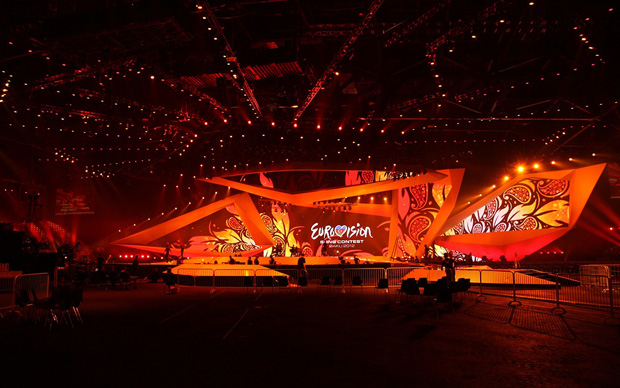
(Image: Zeljko Joksimovic/Wikimedia Commons)
While the situation inside the country shifts between bad and worse, authorities have focused their attentions on a wide-reaching international PR campaign. Ahead of hosting the Eurovision Song Contest, authorities ordered urban renewal that saw houses demolished and families evicted. Vast sums have in recent years been poured into the radical regeneration and beautification of Baku, and there’s more to come. There is also the posh London bar Baku, owned by the Aliyevs; the glossy, internationally distributed Baku magazine, edited by first daughter Leyla and co-published by Conde Nast; and the sponsorship deal with Champions League finalists Atlético Madrid. Next year, Baku will again play host to a prestigious international event — the inaugural European Games.
5) They are about to take charge of one of Europe’s most important human rights bodies
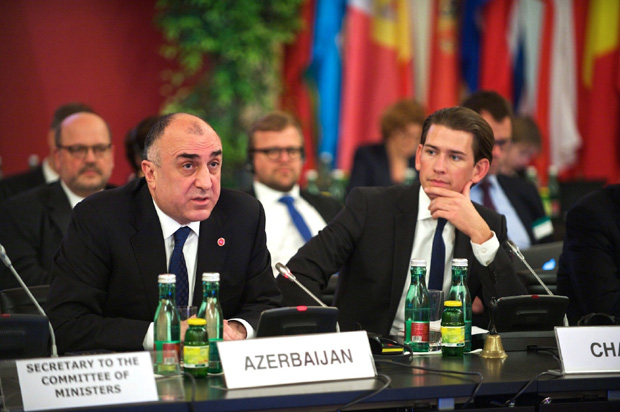
(Image: Sandro Weltin/Council of Europe)
“The Committee of Ministers supervises the execution of judgments of the European Court of Human Rights the Council of Europe…The Committee of Ministers’ essential function is to ensure that member states comply with the judgments and certain decisions of the European Court of Human Rights,” the Council of Europe declare on their website. Next week Azerbaijan will assume the chairmanship of this very Committee of Ministers. But one could say that COE is only sticking to form in its relationship with the country. Only last year, a majority in its Parliamentary Assembly (PACE) voted down a resolution on the existence of political prisoners in Azerbaijan.
This article was originally published on 8 May 2014 at indexoncensorship.org








